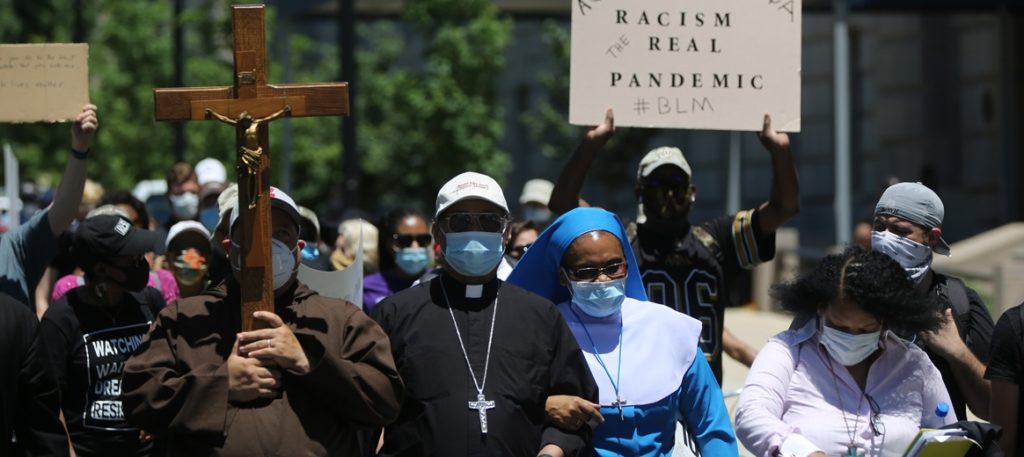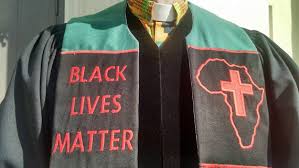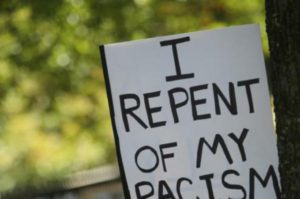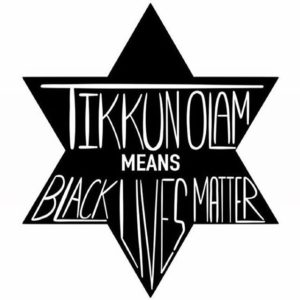Protesting Racism as Religion: Six Activists on Their Faith
How has religion inspired the current protests for racial justice?
 When President Donald Trump raised a Bible in front of St. John’s Episcopal Church last month for his silent photo op, he presented himself in the well-worn role of the faithful Christian President.
When President Donald Trump raised a Bible in front of St. John’s Episcopal Church last month for his silent photo op, he presented himself in the well-worn role of the faithful Christian President.
In all likelihood, the president’s team chose St. John’s Episcopal Church because almost every sitting president has attended that church. They also surely selected that church because a small fire erupted there during the initial protests over George Floyd’s murder—a convenient focal point for Trump’s outraged calls for “law and order.” However, minutes before the president stood there with the Bible (we’re not sure if it was his), protesters—priests among them—were driven from the area by force. The Episcopal Bishop of Washington, the Right Rev. Mariann Budde, did not share Trump’s anger about the fire. “It’s a building; no one’s life is gone,” she said. “The rebuilding of our country…is more important.”
The subtext of Trump’s Bible photo op is that the protesters demanding racial justice are anti-Christian. At his rally in Tulsa, Oklahoma, Trump articulated that point when he again referenced the minor fire at St. John’s, implying that protesters and his critics threaten religious freedom. “Joe Biden and the Democrats want to prosecute Americans for going to church,” Trump said, “but not for burning a church.”
But the story that protesters are anti-Christian, or even indifferent to religion, isn’t true. Such a portrayal of the protesters overlooks the fact that many victims of police brutality, like George Floyd, were people of faith.
“Here is the story that is told about religion and racial justice today: The U.S. civil rights movement was led by Black male ministers harnessing the socially transformative power of the Christian tradition,” writes Vincent Lloyd, Associate Professor of Theology and Religious Studies at Villanova University. Whereas the movement for Black lives today is led by Black youths who, the story goes “are largely detached from Christianity.”
“This story is false.”
According to Lloyd, both the Civil Rights Movement and the recent uprisings for racial justice are shaped by religion—just in different ways.
Unlike the Civil Rights Movement, which had Martin Luther King, Jr. a Christian minister and Malcolm X, a Muslim leader, among many others at the helm, Black Lives Matter has a more disparate leadership and participation. And the religious sensibilities of recent protests for racial justice reflect the religious diversity of the country’s inhabitants today, over 25 percent of whom can be described as “nones”—spiritual, but not religiously affiliated. In his research, Lloyd focuses on how Christian concepts of love and justice imbue protests. In Black Lives Matter, Lloyd sees “a concern for the self, the soul, and the community expressed in terms of religious provenance and resonance.” While there isn’t a single religious tradition inspiring the current movements for racial justice, plenty of organizers consider themselves and their work spiritual.
Here, six activists in the New York area describe the role their respective religions played in deciding to protest for racial justice and equality.
Responses have been edited for clarity and length.
Protesting Injustice as Worship: Nicole Najmah Abraham
Najmah Abraham organized a protest march of over one thousand people with Esraa Elzin (see below) and Nazahah Booth, called Muslims Against Police Brutality. The protesters travelled from Bay Ridge, Brooklyn to the Barclays Center, where outside they held Jummah prayers, the prayers Muslims say on Fridays. Non-Muslim allies formed a circle around those praying.
“As Muslims it is commanded of us, by our Creator, to fight against injustice. We can’t look at anything—hunger, poverty, racism—except from the perspective of trying to eradicate. In our own community we’re dealing with anti-Blackness, and some non-Black Muslims have said that this isn’t our problem. So how do we as a community fight this issue? We organized a Black-led, Muslim-led, Women-led, protest. We had a lot of allies that were non-Black Muslims, which was important.
The protest was a testament to what we understand as Muslims. It shows the balance of how Muslim men and women come together for the sake of their Lord. Everything we do as Muslims we lead with prayer and worship—just being able to protest injustice is a worship. But to stand with other people of faith who observed our Jummah, our Friday prayer, was very beautiful.”
Just and Fair: Esraa Elzin
“Islam has an explicit anti-racist tradition and we noticed a void in the Muslim community not speaking up for justice….The Muslim community of Bay Ridge is often immigrants from Middle-Eastern countries who aren’t understanding/knowledgable on social injustice.
One of the most famous quotes cited in Islam regarding equality is ‘No Arab has any superiority over a non-Arab, nor does a non-Arab have any superiority over an Arab. Nor does a white man have any superiority over a Black man, or the Black man any superiority over the white man.’
Racism exists in all religions. The goal is to create a more inclusive and diverse space within religion, seeing more mosques that have Black Imams, seeing more Islamic teachers who are Black.”
Jesus the Revolutionary: Hawk Newsome
Hawk Newsome, based in the Bronx, leads Black Lives Matter New York (BLM NY) with his sister Chivona Newsome. Their parents were Civil Rights activists.
 “I think that Our Lord and Savior Jesus Christ was a revolutionary. Jesus went around from town to town holding rallies of sorts and preaching the Good Word to the people. What we talk about [in Black Lives Matter] is freeing people, what we talk about is loving people. What we talk about is Christianity. We always pray before movements, before marches, we ask for guidance. We ask that God guides us.
“I think that Our Lord and Savior Jesus Christ was a revolutionary. Jesus went around from town to town holding rallies of sorts and preaching the Good Word to the people. What we talk about [in Black Lives Matter] is freeing people, what we talk about is loving people. What we talk about is Christianity. We always pray before movements, before marches, we ask for guidance. We ask that God guides us.
God is on the side of the oppressed. Not only do we try to guide people, but we try to teach them a better way to live, a more loving way to live, and that’s very Christian-like.”
White Catholics Need to Listen: Felix Cepeda
In early June, the New York Police Department ambushed a group of peaceful protesters in Mott Haven in the Bronx. About a hundred protesters were handcuffed, with others reporting that officers beat them with batons. Felix Cepeda was one of the protesters arrested. In late June Cepeda began a vigil outside New York City’s Columbus monument. He sees the statue as a symbol of oppression and is demanding the statue’s removal.
“Here in the United States, I see how many white Catholics do not try to listen and understand the racism that many of their Black, brown, indigenous and other minority Catholic sisters and brothers experience every day.
There are regular Catholics in my life and famous Catholics like Sister Thea Bowman, Father Bryan Massingale, Dorothy Day, Oscar Romero, Cesar Chavez that motivate me to see that there will always be a few Catholics that will stand against racial injustice and injustice in general inside the Church and in society. These people in my faith community inspire me to continue to pray, speak, write, think and act against racial injustice in the church and in society.”
How Worship and Social Justice Come Together: Sarah Ngu
Sarah Ngu is executive director of Forefront Brooklyn Church, an interdenominational and progressive Christian Church. She has attended several rallies for racial justice as part of a protest group at her church.

“At Forefront we lay a theological foundation for what it means to be political and a Christian, or Jesus-follower. We’re not partisan, we don’t say who to vote for. But we have weekly action items for parishioners to call legislators, for example, on issues like #DefundThePolice and #CancelRent. After service we have been hosting “brunches” on zoom. Right now there is a meeting space for white allies, and another for people of color, and sometimes a separate call for Black church members to talk about how they’re feeling right now.
At the heart of why we believe in defunding police and reinvesting funds in social services is our belief in restorative justice. When someone commits a crime, we have to ask why, not just jump to punishment. This stems from our view of the cross—we don’t interpret it as God punishing God’s son for our sins, but rather God demonstrating solidarity with us to rescue us from the works of the devil.
Our church wasn’t always progressive. We lost members of our congregation when we became LGBT-affirming, and then again when Trump was elected because people came to us and said we were too political. But we want to show how Gospel and social justice come together.”
Tipping the Scales of Justice: Maayan Zik
Maayan Zik is a Black Orthodox Jewish woman and one of the organizers of “Tahalucha for Social Justice,” a protest movement against police brutality led by the Hasidic Chabad-Lubavitch community in the Crown Heights neighborhood of Brooklyn. “Together, we are raising the flame of justice and kindling it in hearts and minds,” Zik said in her speech at the protest.
 “Racism is definitely there in my faith community. Every group has work to do. I think a lot of the work to change racist ways within Judaism will be through education. I think some people don’t do it on purpose or out of a particular hate, but have projected learned and ignorant behaviors without fully realizing how painful or seemingly malicious their behavior is. Education is key and an openness to learn.
“Racism is definitely there in my faith community. Every group has work to do. I think a lot of the work to change racist ways within Judaism will be through education. I think some people don’t do it on purpose or out of a particular hate, but have projected learned and ignorant behaviors without fully realizing how painful or seemingly malicious their behavior is. Education is key and an openness to learn.
Within the framework of Judaism, there is a call to action to seek out and help justice prevail, so that played a role in choosing to help create a protest. There’s this idea that an individual can tip the scales in favor of good with the performance of mitzvot [commandments]. That we all have this individual super power is amazing and empowering.”
“Anyone,” Zik said, “can ‘Ker A Velt’—turn the world over and change it for better.”
Eloise Blondiau is a journalist and radio producer specializing in religion and culture. Her work can be found on New York Public Radio, Vox, and America magazine.